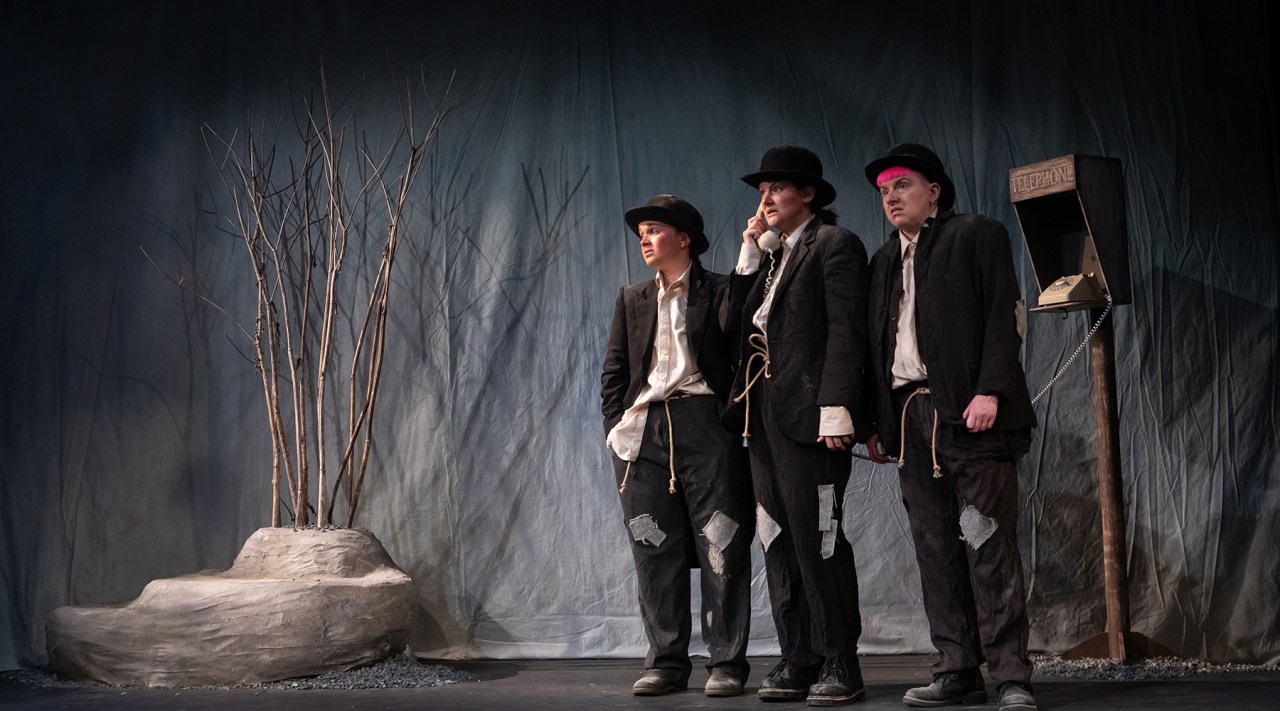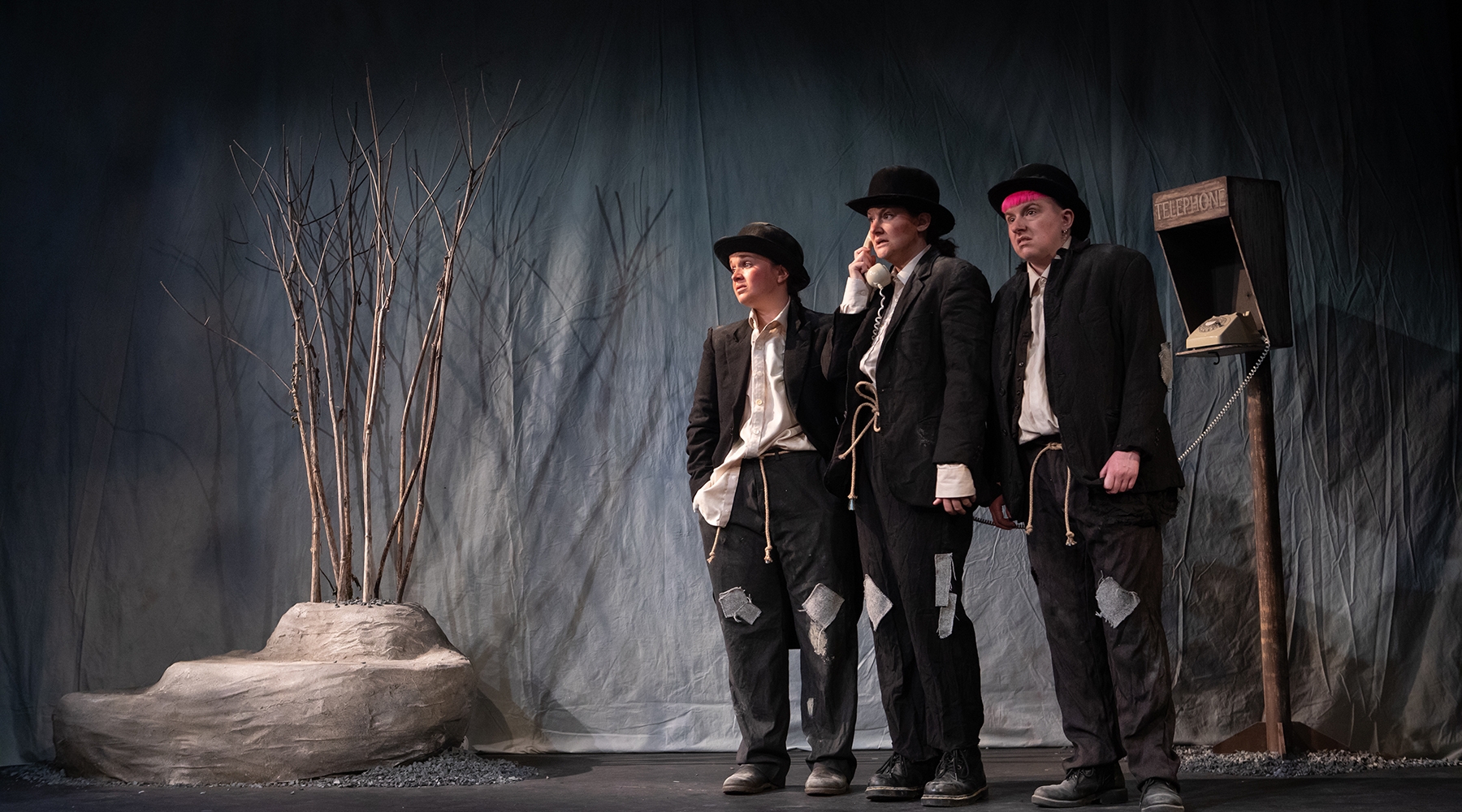Godot Is a Woman opens with three tramps standing on a bare stage beneath a solitary upright. This isn’t Samuel Beckett’s famous drama about a pair of vagrants, Vladimir and Estragon, who wait in vain for a mysterious visitor. This is a spoof in which a trio of actors (two female, one non-binary) seek a licence to perform the script that Beckett insisted must be played by male actors only. The upright prop is a telephone box and the thesps are trying to get through to the Beckett estate. They’re answered by a robotic female voice. ‘You are 9,124th in the call queue.’ A burst of inane lift music fills the air and the actors pass the time by performing a comic dance routine that lasts 15 minutes.
This is a high-risk strategy because a funny dance is always in danger of becoming tedious or repetitive. And the key joke, namely that the call queue and the time-wasting dance are a parody of the play itself, isn’t a particular strong idea. But these performers are exceptional. Josie Underwood, Jack Wakely and Cara Withers work like a single comic organism and their on-stage antics have a tremendous sense of fun, sweetness and mischief. The laughs are never forced but seem to emerge out of thin air. And although they’ve rehearsed their moves meticulously, they manage to pretend that they’re inventing the whole thing on the hoof.

From here, the show evolves into a series of sketches about various overlooked aspects of Beckett’s play. The tramps have carrots in their pockets, like Vladimir and Estragon, but they also carry peelers and they insist on skinning the vegetables before they eat them. Two lecturers appear, Dr Whimple and Dr Whomple, who deliver a comic talk about the prostate difficulties from which Vladimir allegedly suffers.
The centrepiece is a chaotic show trial where each witness takes the oath on a copy of the text. ‘Do you swear to tell the truth, the whole truth, and nothing but the truth, so help you, Godot?’ During the trial, the amusingly shambolic comedy continues but the moral arguments falter a little. We’re told that in 1988 Beckett sued a company of actresses and prevented them from staging Godot without a licence. This statement presents Beckett as an aggressive litigant. In fact, he was merely protecting his work from misinterpretation by vandals who disrespected his artistry.
Godot Is a Woman will have you laughing all evening and arguing all night
The same confusion underlies Godot Is a Woman. If these actors genuinely admire the play and revere Beckett as a dramatist and thinker, they should be content to accept the rules laid down by him for productions of his work. The idea that Beckett was a rotten old sexist doesn’t pass muster because he refused to let male actors play Winnie, the heroine in Happy Days. The show trial culminates in a preachy list of female deeds accomplished since Beckett’s death in 1989 (including the first spacewalk by a woman in 2019) and the judge concludes that Beckett would have been so impressed by female achievements over the past three decades that he would have dropped his objections to actresses playing the tramps.
This is an ingenious but discreditable sophistry. To imagine Beckett’s thoughts on his behalf, and to revise his views after his death, is not a legal or a philosophical argument but an act of fiction. The same fantasy would entitle one to call Churchill ‘a racist’ for ever by claiming that had he survived into the 21st century he would have admitted his willingness to prize Britain above other nations. These are a few of the thoughts provoked by this inspired intellectual comedy. Godot Is a Woman will have you laughing all evening and arguing all night.
Dementia is a tempting but tricky subject because it involves the collapse of the central character. The audience must invest their emotional interest in a figure who slowly withdraws from the action. Take Off Your Cornflakes, by Rose Henderson and Pat Nolan, avoids this problem by focusing on the early stages of the disease.
The original script, set in Dublin, has been adapted by Mark Lockyer and transposed to the Seven Sisters Road, which resonates better with London audiences. Lockyer plays the roles of Tom and Trish, a happily married working-class couple. Tom drives a bus. Trish keeps house for her husband and their two kids. At the age of 53, Tom realises that he’s starting to lose his marbles. The car keys go missing. He can’t name simple household objects. His mind is about to disintegrate but he has enough of it left to foresee his fate. Lockyer conveys the horror of Tom’s predicament but he stays in touch with his humour, defiance and courage. The tragedy comes out in tiny details. At Christmas Trish must buy a present for herself and inscribe it, ‘Love from Tom’. Heartbreaking.








Comments